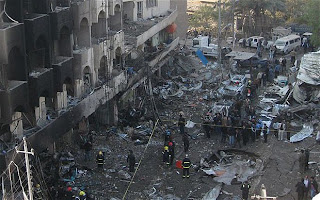We haven’t got all the details, but promptly after the departure of US combat troops the Iraqi Prime Minister is feuding badly with Sunni political figures, and a bomb blast suggests that Iraq may be escalating into more sectarian conflict.
If so, what does this say about the surge? On one hand, the relatively quiet withdrawal of American troops on Tuesday vindicated one objective of the surge: to create more stable conditions to that America could pull out quietly without it being humiliated and without the kind of chaotic flight to the exits that would polarize its society.
On the other hand, the major declared objective of the surge launched by President Bush II in 2006-7 was to depress levels of violence, secure the population and thereby create critical space in which there could be political progress and reconciliation.
Advocates of enlightened counterinsurgency and muscular state-building argued that Iraq vindicated their position. They argued that the combination of more troops and more restraint played a major role in depressing the levels of violence and giving Iraq a breathing space to recover from the communal bloodletting it suffered in the post-invasion years.
But if Iraq descends again into the traumatic violence of 2005-6, we must acknowledge that this approach had its limits. It bought time and got the issue off the front pages – no small thing for a superpower that has seen presidencies destroyed in the past by protracted small wars – but a new civil war of sorts would suggest that the surge did not achieve its most profound objective.
Its not actually obvious, historically, that gentler, more sophisticated ‘hearts and minds’ campaigns necessarily work, if we define success as marginalising insurgencies while leaving behind a strong state that governs in the interests of the departing occupier.
Successful counterinsurgency campaigns in the past relied on favourable geopolitical conditions and some pretty unsentimental techniques. Forced population resettlements, virtual concentration camps (albeit with well-run facilities), indiscriminate bombings, bribery on a massive scale, proxy violence, etc. Which is precisely one reason why I am uneasy with our countries doing this kind of campaign, given the dark price victory has often exacted.
In some ways, the Petraeus revolution mixed the fluffy, appealing liberal versions of hearts and minds (cultural literacy, heroic restraint, a population-centric view that you can’t kill your way out) with some hard-nosed methods, such as walling off warring communities, putting potential insurgents on the payroll, and sustaining a round-the-clock kill and capture programme.
And yet, car bombs are going off and there are new rumours of war.
Alternatively, there is the line being peddled that America should not have left. Making Iraq an indefinite commitment would be mightily expensive. And by shouldering this burden well into the future, it would come at other costs, putting the US in the eye of whatever storms were coming in the future.
Ultimately, Iraq showed in a brutal way how limited American power is. If the surge only bought some time and space, and postponed another round of internal conflict (possibly metastasizing into a wider regional one), then policymakers should not conclude that perpetual armed nation-building works if only we get our methods right. Ultimately, COIN just isn’t a venture that we should fatalistically accept as part of our strategic future.
Contrary to the late Christopher Hitchens, endless war is not only a bad idea. It is beyond America’s limited strength. And compared to its costs, its dividends, at least in this case, may be slight indeed.
Cross posted at Offshore Balancer.
Patrick Porter is Professor of International Security and Strategy at the University of Birmingham. He is also Senior Associate Fellow at the Royal United Services Institute, London. His research interests are great power politics, grand strategy, realism, the causes and consequences of major powers’ decline, the Iraq war of 2003, foreign and defence policy in the US and UK, and the intellectual life of major powers and their foreign policy establishments. He has written four books. His book Blunder: Britain's War in Iraq (Oxford University Press, 2018) was shortlisted for the British Army Military Book of the Year Prize, 2019. His most recent book is The False Promise of Liberal Order: Nostalgia, Delusion and the Rise of Trump (Polity, 2020). He also wrote The Global Village Myth: Distance, War and the Limits of Power (Georgetown University Press, 2015) and Military Orientalism: Eastern War through Western Eyes (Columbia University Press, 2009.


0 Comments